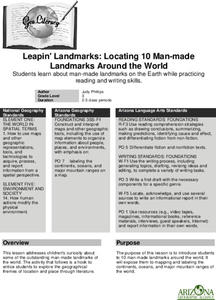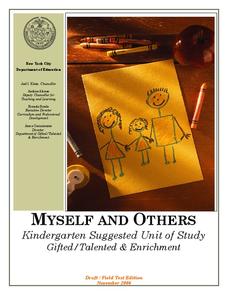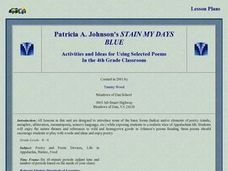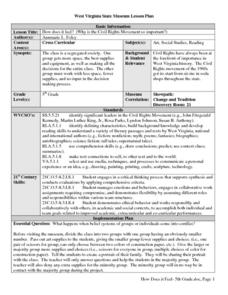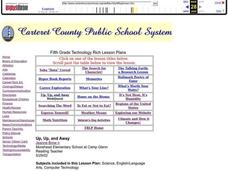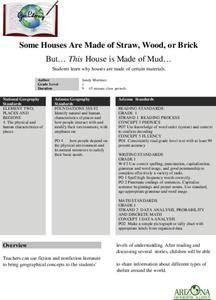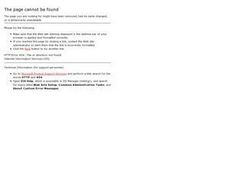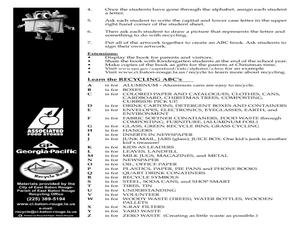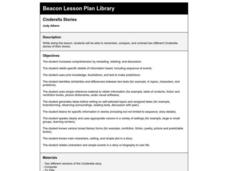Curated OER
Leapin' Landmarks: Locating 10 man-made landmarks around the world
Third graders engage in a lesson which addresses their curiosity about some of the outstanding people-made landmarks of the world. They explore the geographical themes of location and place through literature.
Curated OER
Primary Sources and Protagonists: A Native American Literature Unit
Introduce your middle schoolers to the lives of past Native Americans. First, learners work together to put photographs in a sequence. Then, using their sequence, they create stories to share with the whole class. No matter how old your...
Curated OER
Analyzing the Use of Irony in a Short Story
Ninth graders examine how literature connects to real-life and see how irony aids in the development of theme. They read Shirley Jackson's The Lottery, and discuss elements of foreshadowing and situational irony. Then learners will write...
Curated OER
Figurative and literal language through the study of Shakespeare
Sixth graders explore figurative and literal language. They study literary devices through short pieces of Shakespeare's work. Then investigate Shakespeare's works and life.
New York City Department of Education
Myself and Others
Self reflection is an important skill to reinforce in our children, and it's especially helpful to help them realize who they are in the context of their environment. A collection of lessons about self image and community encourage...
Curated OER
Stain My Days Blue
Students read several poems related to the life and culture of the Appalachia region. They are introduced to the poetic forms of simile, alliteration and onomatopoeia and respond to the poems through journal entries and poetry of their own.
Curated OER
How does it feel? Why is the Civil Rights Movement so Important?
Fifth graders study the Civil War. In this US history lesson, 5th graders simulate what life was like during the Civil War by having two groups with one group given more materials than the other group. Students then draw a...
Curated OER
LETTER FROM ONE CHARACTER TO ANOTHER
Fourth graders read stories and pick one with characters they find interesting. Then students create a dialogue of writing a letter from one character to another. The letter must relate to the original story in some way that can easily...
Curated OER
The Stinky Cheese Man and Other Fairly Stupid Tales
Sixth graders demonstrate the ability to process and evaluate content from a variety of sources and apply comprehension skills to the material read. They organize information for practical use and design and develop an informational...
Curated OER
Up, Up, and Away
Fifth graders participate in a WebQuest that introduces them to a study on clouds and how they relate to weather systems.
Curated OER
Poetry Creations
Students produce iMovies to share their thoughts of friendship along with poetry creations in this technology-based lesson for the upper-elementary classroom. The lesson includes a link to a "create a poem" site and requires computers...
Curated OER
News to the Core Reported by Very Special Students
Students create news articles that help them build their knowledge, skills, and academic confidence. In this special education lesson, students use previous knowledge to write a newsletter and demonstrate their understanding of various...
Curated OER
Eloquent Speech
Second graders discover that oral and written communication can be improved, and made to sound more eloquent, when the following questions are addressed; Who? What? Where? When? Why? students use word processing to copy a poem using clip...
Curated OER
Some Houses Are Made of Straw, Wood, or Brick: But... This House is Made of Mud...
First graders read and discuss several stories. They share information about different types of shelter around the world. They explain that lifestyles and shelter depend very much on where people live and how they use the resources...
Curated OER
What It Means to Be an American Indian
Students analyze primary source documents and evaluate historical evidence to find consequences of the policies that were adopted from the 1830s to today regarding Native American Indians.
Curated OER
The Recycle Alphabet
First graders recognize words associated with recycling. In this environmental lesson, 1st graders go through the alphabet and think of words associated with recycling that start with a letter. Students create a recycling ABC book.
Curated OER
Examining Women's Roles through Primary Sources and Literature
High schoolers interpret historical evidence presented in primary resources. In this women's history lesson, students examine the role of women prior to and following the suffrage movement. High schoolers also read selected pieces of...
Curated OER
Comparing Themes Across Texts
Read various texts to compare the themes across each text. Learners write a journal entry describing the most beautiful scenery they've seen and use a map of the United States to locate the Sequoia National Park and Muir Woods. They then...
Curated OER
Cinderella Stories
Students read and compare Cinderella stories using a worksheet. They write and illustrate original tales with a twist.
Curated OER
"A Pig is Big"
Students explore the concept of big, bigger, and biggest. They examine and classify items by size, listen to and discuss the book "A Pig is Big," complete a fill in the blank activity, and create a tri-fold that illustrates two items...
Curated OER
Radical Reads
Students recreate an "American Idol" contest in which they present their favorite books to their classmates using arguments for and excerpts from the books. Following the presentation, students will be polled and the least popular books...
Curated OER
Trouble With Trolls
Students listen to The Trouble With Trolls and discuss fables. In this story elements lesson, students work on reading skills. Students participate in different reading activities.
Curated OER
What Genre Am I?
First graders differentiate between different pieces of literary genres by participating in a hands-on activity. This includes a student assessment sheet.
Curated OER
It's Just a Barn
Investigate Pennsylvania Barns. Have your class consider the elements common to Pennsylvanian barns and why they are significant to the food production process. They write summaries of Frederick Watts and his impact on agriculture.


